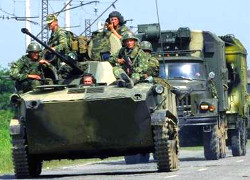Putin menaced Poroshenko with a new attack
74- 27.11.2014, 8:10
- 73,736

Petro Poroshenko had a telephone conversation with Vladimir Putin.
Russian president menaced Ukraine with a new military attack, reports Insider with the reference to their own source in Petro Poroshenko’s administration.
At 10 p.m. on November 26 journalists having waited for an end of PPB’s session saw Mikhail Zybarov, Russian ambassador, was going out of the presidential office building. The ambassador did not comment on a late visit. Later one of representatives of Presidential Administration of Ukraine told that they had a painful conversation with Vladimir Putin in the presence of Russian ambassador. Petro Poroshenko looked unsatisfied all the rest time of the session.
“We have a problem with Russia. They menace to launch an attack and want us to recognize separatists “Republics” and to give up on intention to accede NATO and the EU” said a talker.
One more close to the Ukraine’s president source reported that there were no more talks with Moscow for more than a week. The last one took place during the summit in Australia.
“Before they had almost every day telephone conversations plus we were talking by means of mediators. But now we have stopped holding talks. And cannot find out what he (Putin) has in his mind”, said the talker the day before.
It should be reminded that on November 19 the press-secretary of Kremlin Dmitry Peskov stated that Russia needed absolute guarantees of Ukraine’s non-accession to NATO. On November 25 the Ministry of Foreign Affairs of the Russian Federation said that Ukrainian ambition to join NATO might cause further aggravation of the situation and it would not enable Ukrainian people to better.
Before it Petro Poroshenko, the president of Ukraine, stated that Ukraine was retracing Euro-Atlantic Integration based course.
According to sociological group “Rating”, in Ukraine in November the highest level of nationwide support of accession to NATO was noted. If the referendum on Ukraine’s accession to NATO took place a half of respondents (51%) would support this intention, but fewer (25%) were against it. Another quarter would not take the decision or would not vote.










